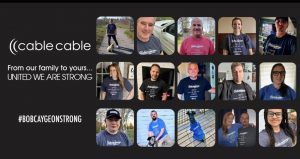
Tech support mimes and other stories
By Ruby Pratka
THE COVID-19 PANDEMIC has forced many industries to radically, and quickly, reform the way they work and the telecommunications sector is no exception. Across Canada, independent telecommunications providers are adapting to the massive spikes in Internet usage and the need for contactless customer service (for its employees and consumers).
Weeks before the Quebec City region recorded any cases of Covid-19, Maryna Carré and her colleagues at Coopérative de câblodistribution de l’Arrière-Pays (CCAP) in the Charlesbourg sector of the city held a strategy session — just in case.
“Even before the state of emergency was declared [in Quebec], we were working on a pandemic preparedness plan, although we didn’t think we’d have to use it,” Carré recalls. “It was a best-practices exercise where we worked out a plan for employee safety. We didn’t realize we would be applying it so fast.”
On March 13, the day after the region recorded its first case of Covid-19, the province closed all schools. A growing number of businesses, including CCAP, sent their employees home. “At that point, we really had to reflect on what we would do, in practice, to continue operations and manage the impact on clients,” says Carré.
Safely ensconced in their living rooms or kitchens or whatever nook they could find, employees braced for a spike in Internet usage and an avalanche of service calls. In mid-March, companies with a large “snowbird” clientele, like CCAP, DéryTélécom in La Baie, Que. and Cable Cable in Bobcaygeon, Ont., saw a spike in installations and reactivations as the snowbirds flocked back early. Suddenly everyone was using residential Internet, all the time.
“It used to be that Sundays and weeknights around 7 p.m. were peak times for Internet usage,” said Matt Stein of Toronto-based Distributel, which offers high-speed residential Internet, television, home phone and long distance service in Ontario, Quebec, Alberta and British Columbia as well as business services. “Now every day is Sunday. Our enterprise networks are very quiet, but our residential networks are busier than ever with people making online conference calls and streaming.”
“Whatever ‘normal’ becomes, we’ll adapt.” – Jayme Hughes, Cable Cable
“Since kids were home from school and a lot of adults had either lost their jobs or started working from home, that increased demand and consumption of TV and Internet,” Carré added. “A lot of people wanted to top up their packages.” CCAP, along with many of its competitors, got rid of Internet overage fees and unscrambled some cable channels (including RDI, French Canada’s version of CBC News Network) with the agreement of the networks. CCAP also allowed customers to top up their internet plans with no extra fees for three months. As a co-op, it was also able to apply $50 annual rebates to members’ bills early, collectively saving them $900,000.
Distributel has also waived overage fees and started extensively promoting a work-from-home plan with faster upload speeds and an enterprise plan that allows businesses to pay for and co-ordinate employees’ home Internet through a single ISP. They’ve also dispensed some practical advice, encouraging clients to switch to mesh routers to get rid of “dead zones” in their homes, and start conference calls at five past the hour instead of at the top of the hour to work around temporary network overload.
Going contactless
Ensuring customers are happy with their packages is one thing; ensuring equipment can be installed is another. Companies have had to innovate to make contactless tech support easier. In some cases, technicians have had to call on their mime skills. “Instead of having clients come by the office to pick up equipment, we drop it off… the installers stand out on people’s balconies and walk them through the installation,” says Nathalie Gagnon of DéryTélécom. “Luckily, the clients have been very collaborative.” If technicians must go into customers’ houses, Gagnon says, they go in masked and gloved.
One of the clients of Cable Cable, which serves the Kawartha Lakes region, is the Pinecrest nursing home in Bobcaygeon where one of Ontario’s first serious Covid outbreaks occurred. “There are certain buildings like nursing homes and multiple dwelling units that our technicians will not enter,” said director of communications Jayme Hughes. To reduce the likelihood of technicians having to enter clients’ homes, the company includes a highly visual installation guide. They also toss in a free bottle of hand sanitizer.
bottle of hand sanitizer.
“We have done a user feedback survey since the pandemic started, and our technicians have done a great job,” she added. Cable Cable has also contributed to local aid efforts, deferring billing for the hard-hit nursing home and supporting a local relief fund through buying t-shirts for staff (pictured, from the company’s Facebook page).
All four companies say their post-pandemic re-adaptation has gone smoothly, with no major outages and special attention paid to new hygiene and safety rules, such as wearing masks and disinfecting equipment. “We’re encouraging staff to work from home, obviously stay home if they’re sick, and be even more cognizant of workplace hygiene, and I think it will become more common for all companies to do that,” Hughes says. “Whatever ‘normal’ becomes, we’ll adapt.”



